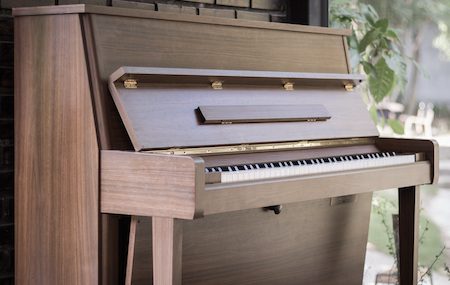“It might sound strange, but lately, I’ve been trying to bring more sustainable, eco-friendly items into my house. I’ve been looking at pianos, and started wondering how they’re made. Are pianos eco-friendly?”
Great question.
When people purchase a piano, they bring all sorts of questions with them. And occasionally, we are asked about sustainability too.
Overall, pianos are created from more than 10,000 pieces. Some of its wood. Some of its metal. But it all comes together to create an instrument you can enjoy for life.
New or used?
Before diving into the way pianos are made, it’s essential to talk about lifespan too. When you purchase a high-quality piano, you can reasonably expect it to last for a generation or more. When well cared for, a piano can be enjoyed for decades.
If you look back at some of the top piano brands in history, you’ll find many of them still make good investments today. Because dealers understand quality, they often purchase used pianos back from clients, ensure they’re in good working condition, and then resell them to families looking for a good investment.
New or used, if you pay attention to quality, you can expect decades’ worth of use. This isn’t something you’ll use and throw away anytime soon.
Ivory piano keys
A lot has changed in the past century.
When pianos were first invented, they were made from a variety of materials. Ivory became popular for both looks and playability. Musicians enjoyed the feel of ivory underneath their fingertips, and it created a valuable item that people enjoyed showing off inside of their homes.
During the Great Depression, manufacturers began using plastic in place of ivory as a way to save money. They also found plastic was easier to work with, especially in manufacturing lines.
By 1989, the use of ivory was officially banned from use. You can no longer purchase ivory. If you own or buy a piano built before 1959, there is a strong possibility it is made with ivory. How you feel about owning something made with this product is up to you.
Eco-friendly
Many of today’s manufacturers work hard to create products that won’t harm the environment. Some brands create manufacturing processes designed to be sustainable and ethical. They pay attention to energy reduction and how they source their materials.
The Forest Stewardship Council (FSC) ensures wood is sourced and harvested sustainably. You can check if the brand you’re purchasing follows their guidelines for the wood used in manufacturing.
It’s your choice
If you truly wish to be more eco-friendly with every purchase, stop by and chat about what instrument may be the best choice for you. We can help you identify top brands for consideration, and provide details to help you make the right decision.
What questions can we answer for you?


